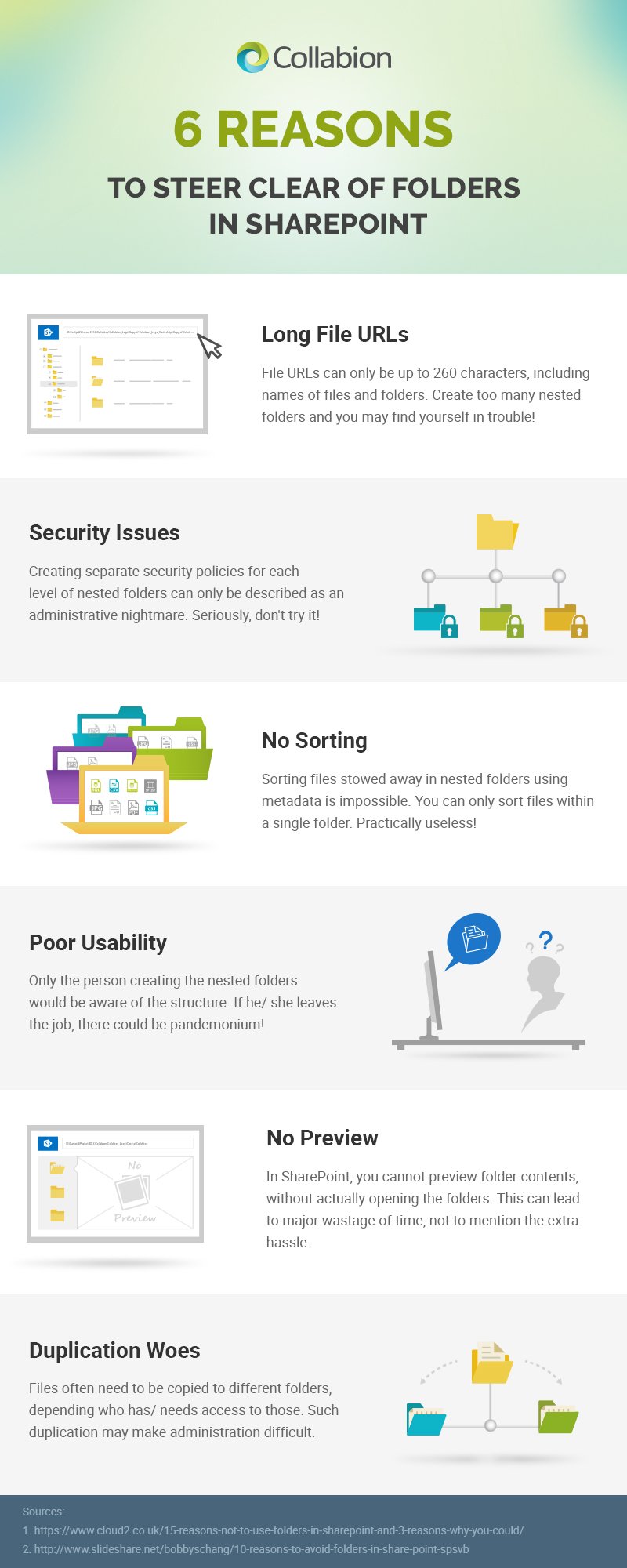While Microsoft SharePoint does support folders for storing documents, many SharePoint experts discourage users from doing so, since it robs the platform of many of its advanced and flexible features. We did our own research on the subject and found 6 major reasons to avoid creating folders in SharePoint, which we have presented in the infographic below. Take a look.

So, there you have them – 6 reasons why we feel creating folders in SharePoint is a bad idea. Do you agree with our reasons? Or do you feel folders can have their uses? Discuss in the comments below.
Like what you see? Check out our series of highly shareable infographics:

Finally someone wrote a blog post on issues with SharePoint Folder. THANK YOU!
I mean, considering the long file URL’s, duplication woes and no previews, it seems archaic that SharePoint still doesn’ change the way it handles folders.
Thanks a ton, this did really make my day!
yes, agree with this post; nevertheless it is not so easy to quit the folder paradigm :
– business users are often not ready to change
– Sharepoint could be difficult to use when trying tou use only metadata navigation
– we have to offer consistent solution both to online users (ok, let’s go without folders…) and to mobile users, who will use OneDrive PC app and mobile apps
– remind tht a lot of persons still ask for the Explorer view, just because it still is the best way for managing some current life situations (move files & folders, rename folders quickly, use archive files…)
We agree, absolutely. It is difficult to step out of one’s comfort zone, especially when we get so used to creating nested folder structures for storing files. And yes, the Explorer View is just like that. Sadly, using folders pretty much cripples SharePoint search, which is one of the major reasons why we discourage using them.
But now Microsoft has introduced another limitations to the mix, SharePoint online 5000 document throttling. If you have more than 5000 documents in a library you have to use folders in order to be able to view the documents. A combination of indexes, complex metadata tags and folders are the only way you can work with large numbers of files. So folders are now back in the mix even though you are correct with your post that folders are bad.
Hi Pete, thanks for your input. We agree with you on the point that folders offer some advantages in SharePoint. However, we believe the features that are crippled when a user creates folders are quite a heavy price to pay for a few advantages. That’s why we always discourage the usage of folders.
Also, we believe the 5000 document limit applies to the number of documents you can display in a single view, as per this entry on Microsoft Support Center. The total number of document you can store in a library is way higher than that.
Also, our post focused on on premise installations of SharePoint only, where the limit of documents supported by a single document library is considerably higher than SharePoint Online. If you consider the limits set by Microsoft for SharePoint 2016 (featured here), then it is astoundingly high!
just read this and have to respond. I’ve worked with SharePoint since SP2001. believed and evangelized metadata/no folders for years. Until i finally got a clue about designing for the user, not IT. It has to be a both/and, NOT an either/or. When people want to use SPO from mobile, there must be folder structures in the background or else you will lose people to any other cloud storage tool. Until Microsoft can make the views accessible from a good mobile view (not IE), then it must be a both/and experience. The #1 rule of change management is meet the user where they are first and then bring them forward… So allowing folders, but pushing for multiple document libraries, is a good in between. It all comes down to the user and the user experience they want.